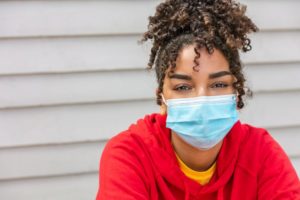
You may have gotten used to wearing a mask, but the smell of your breath? Not so much. Mask mouth has become a common problem, causing stinky breath as well as a wide range of other oral health issues. But how does wearing a facemask affect your oral health? Read to learn the answer and get some easy tips for keeping your mouth healthy while staying safe during the pandemic.
You may have gotten used to wearing a mask, but the smell of your breath? Not so much. Mask mouth has become a common problem, causing stinky breath as well as a wide range of other oral health issues. But how does wearing a facemask affect your oral health? Read to learn the answer and get some easy tips for keeping your mouth healthy while staying safe during the pandemic.
What Causes Mask Mouth?
Mask mouth is that bad odor you smile while you wear your mask to protect yourself from COVID-19. There are a few causes, but the main culprit is dryness. Your saliva flow protects your mouth from bacteria that causes dental problems and odor. However, the use of facemasks has made it more difficult for your mouth to create saliva because it blocks your air intake, allowing bacteria to grow inside. This not only creates smelly breath, but it could even contribute to serious oral health concerns.
Other Ways that Facemasks Impact Oral Health
Bad breath is gross to deal with, but some problems that come with mask mouth should be taken seriously. When your saliva flow decreases, you have a higher risk of cavities and tooth decay caused by sugars that interact with the bacteria in your mouth. Additionally, gum inflammation, one of the initial symptoms of gum disease, can be a result of bacteria building up. Without the antimicrobial properties of your saliva, the bacteria will continue to attack your gums.
Changes in Your Lifestyle
Facemasks are essential these days, but they do cause a few minor changes in your day to day life. Primarily, they make drinking water more of a chore than it used to be, which causes you to automatically drink it less. This can be a significant problem because water stimulates saliva flow, and it helps wash away food debris. Without drinking water regularly, you could be allowing bits of your last meal to linger and cause issues like odor and decay.
How to Keep Your Smile Healthy
Thankfully, bad breath and the other oral health issues that come with wearing a facemask are completely avoidable with a little know-how. The first step is to ensure that you’re diligent about your brushing and flossing. Brush twice a day for two minutes each session and floss once to remove pesky food caught in between teeth. To keep your breath fresh, add a nonalcoholic mouthwash to your routine (alcohol dries the mouth out). It’s also vital to drink lots of water. Most tap water contains fluoride, which is a naturally occurring mineral that protects your teeth and fights decay. Plus, water will help stimulate your saliva flow while your mask is on. Be sure to always leave the house with a water bottle, and use a straw so you can easily take sips without taking your mask off.
Lastly, don’t forget about your routine dental appointments. These visits allow your dental hygienist to remove plaque and tartar that couldn’t be cleaned at home, and your dentist will be able to catch any problems early before they become severe.
You already have plenty of extra things to worry about these days, so follow these tips so mask mouth isn’t one of them
Meet the Dentist
At Westside Dental Associates, Dr. Les Latner provides a wide range of preventive dental services, including checkups and dental cleanings, to keep patients healthy and smiling. Dr. Latner is one of fewer than 10 dentists who’ve achieved both accreditation in the American Academy of Cosmetic Dentistry and mastership in the Academy of General Dentistry. He has advanced safety protocols in place to ensure his office is clean and sterilized. If you haven’t seen the dentist in a while, you can set up an appointment through his website or by phone at (310) 477-1081.

